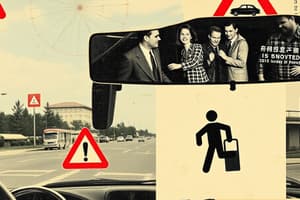Podcast
Questions and Answers
What is illegal and unsafe to do in any travel lane?
What is illegal and unsafe to do in any travel lane?
- Yield the right-of-way
- Stop for any reason
- Back a vehicle unless parallel parking (correct)
- Drive on an unpaved shoulder
Where should you drive when on a road with more than two lanes traveling in the same direction?
Where should you drive when on a road with more than two lanes traveling in the same direction?
- Stay as far to the right as practical (correct)
- Drive in any lane you prefer
- Stay in the left lane
- Stay in the middle lane
Is it acceptable to pass on the shoulder?
Is it acceptable to pass on the shoulder?
- Yes, if no vehicles are present
- No, never
- Yes, when slowing down to make a left turn (correct)
- Yes, always
Which direction should you turn into when making a left turn?
Which direction should you turn into when making a left turn?
A U-turn is made in one smooth ______ motion.
A U-turn is made in one smooth ______ motion.
Where can you NOT make a U-turn?
Where can you NOT make a U-turn?
What should you do if you change your mind about turning at an intersection?
What should you do if you change your mind about turning at an intersection?
Which lane should you turn from on a four-lane roadway?
Which lane should you turn from on a four-lane roadway?
Why should you not turn your wheels while waiting to make a left turn?
Why should you not turn your wheels while waiting to make a left turn?
After making a right turn at an intersection, what action should you take?
After making a right turn at an intersection, what action should you take?
What should you do if you miss your turn on a freeway?
What should you do if you miss your turn on a freeway?
Flashcards are hidden until you start studying
Study Notes
General Driving
- It's illegal to reverse in travel lanes unless parallel parking or completing a Y-turn.
- Do not backtrack on freeways; proceed to the next exit to turn around safely.
- Stopping in travel lanes for confusion or breakdowns is prohibited; pull off the road instead.
- In multi-lane roads, remain in the right lane except for passing; on roads with three or more lanes, stay as right as feasible.
- Avoid driving on unpaved shoulders.
Passing
- Passing on the shoulder is illegal, except on paved shoulders for stopped vehicles turning left.
- Use the left-most lane on multi-lane roads for overtaking slower vehicles.
- Passing on the right has visibility risks and may lead to potential accidents.
Turning
- Make turns directly, without crossing lane lines or disrupting traffic.
- After completing a turn, it's safe to change lanes if necessary.
Multiple Turn Lanes
- Remain in your designated lane when there are multiple turning lanes indicated by signs or road markings.
Right Turns
- After signaling and checking traffic, move into the rightmost travel lane before turning.
- Yield to oncoming traffic, and avoid wide swings that can confuse drivers.
Left Turns
- For left turns or U-turns, target the leftmost travel lane to minimize crossing traffic lanes.
- Always check traffic in both directions before initiating the turn.
U-Turn
- A U-turn is executed smoothly to reverse direction, but specific rules forbid them in certain situations to maintain safety.
U-Turn Restrictions
- U-turns are not allowed at controlled intersections, in business districts, near traffic signs prohibiting them, on undivided highways where visibility is restricted, or if safety is compromised.
Y-Turn
- A Y-turn, utilized in driving exams, is a skill test applicable in narrow residential streets but not recommended for general use.
Performing a Y-Turn
- Begin by checking mirrors and signaling right, pull over and stop.
- Check again for traffic, signal left, and execute a left-angle turn.
- Once clear, back far enough to safely proceed.
Turn Maneuver Principles
- Turns should be performed quickly, shortly, and cautiously to ensure safety.
Left Turn Completion
- After a left turn, adjust to the right lane where safe and feasible to maintain vehicle flow.
Stopping in Travel Lanes
- Stopping in traffic lanes is inappropriate regardless of the situation, including confusion or breakdowns.
Mid-Turn Direction Changes
- If reconsidering a turn during its execution, the best course is to complete it and seek to reroute as necessary.
Proper Stopping for Left Turns
- Yielding oncoming vehicles should be done with tires straight to prevent potential hazards.
Legal Right Turn Lane
- Always turn right from the nearest travel lane to the right curb or edge of the roadway.
Right Turn Preparations
- Re-scan intersections, release brakes, and signal before making a right turn.
U-Turn Visibility
- Do not execute a U-turn where visibility for other drivers is obstructed.
Left Turn from Two-Way to One-Way
- Initiate a left turn with the left wheel near the yellow dividing line for safety.
Keeping Wheels Straight
- Avoid turning wheels when waiting for a left or U-turn to mitigate risks if rear-ended.
Alternative to U-Turn
- A three-point (or Y) turn is recommended when U-turns are not feasible due to space constraints.
Left Turn Initial Position
- Start a left turn from the leftmost lane when possible to facilitate a safe maneuver.
Post-Right Turn Actions
- After a right turn, adjust speed to align with traffic in the right lane to ensure a smooth driving experience.
Missed Freeway Exits
- If an exit is missed on the freeway, proceed to the next exit rather than attempting a risky turn back.
Studying That Suits You
Use AI to generate personalized quizzes and flashcards to suit your learning preferences.




